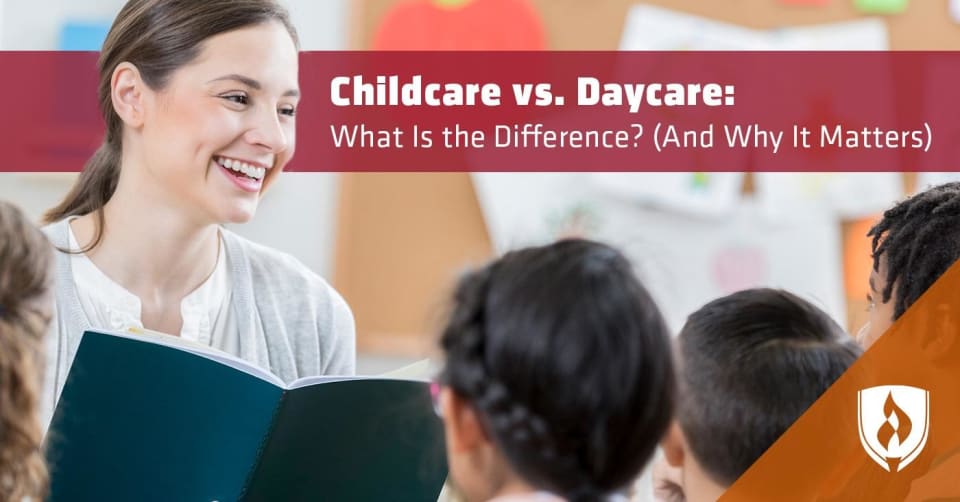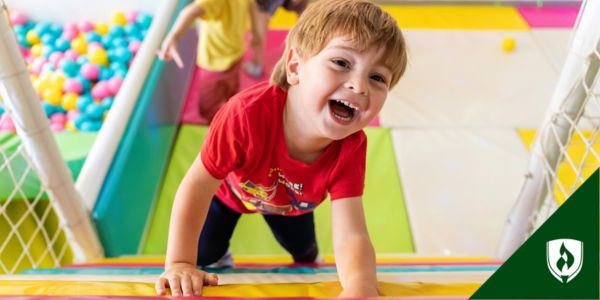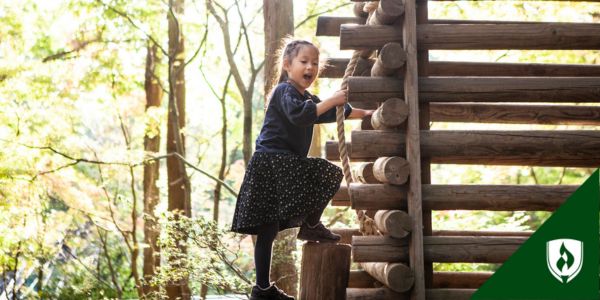“I need to drop the kids off at daycare first.”

“I’ll need to make childcare plans if we do that.”
For a lot of people, the words “childcare” and “daycare” are used interchangeably, referring to the service or place where people entrust someone else to look after their kids. Seems simple enough, right?
Wrong.
While the distinction between the terms “childcare” and “daycare” may seem insignificant to the average person, it is an important issue to many early childhood education professionals.
To help you better understand what the fuss is about when using terms like “childcare” versus “daycare,” we asked Rasmussen University Early Childhood Education instructor Tosca Grimm to weigh in and explain the value of using language that reflects well on the field as a whole.
What’s the difference between childcare, daycare and preschool?
This is a trickier question than you might think. You can find center-based programs billed as “daycare,” “childcare” and “preschool” that, when well designed and run properly, are practically indistinguishable from one another. So what difference does a word make? Grimm says part of it boils down to the scope of what’s covered by each term.
“Preschool” is a perfectly valid term for programs that serve children ages three to five. But that also leaves out the infants and babies who are cared for by early childhood education professionals.
“Every preschooler was an infant or toddler first, and they need a place to be as well,” Grimm says.
The term “daycare” also has limitations—not all ECE professionals work strictly during the day. The other issue many early childhood educators find in the term is its lack of focus on the most important part of the care arrangement—the child. It’s a subtle difference in verbiage, but saying “childcare” instead of “daycare” puts the spotlight on the developmental needs of the child, and not the parents’ need for convenience.
Is it wrong to call childcare “daycare?”
For many ECE professionals, using “childcare” and “daycare” interchangeably isn’t some unforgivable offense—no one is getting banished from the field for using less-than-ideal terminology. Grimm believes those who use the term “daycare” certainly don’t intend for it to be derogatory. It is often merely a holdover term from a time where childcare services were far less professionally established, and little was known about the importance of ECE.
But it should be noted that for those who dedicate themselves to the field and take their important work seriously, the term “daycare” can feel dismissive.
“It’s kind of this inner-circle thing, where those who are authentic educators get it, and it just rubs us the wrong way,” Grimm says. “It’s like telling a professional football player, ‘Oh, that’s just a game with a bunch of sweaty guys running around with a ball.’”
While that’s technically a correct description at a basic level, it just doesn’t do justice to the amount of work and expertise needed to do it well. Early childhood educators are often well educated—many with Master’s degrees—and have devoted years of their lives learning the in-and-outs of child development and effective instructional strategies.
What terms do ECE professionals use instead of “daycare”?
Knowing the limitations of the term “daycare” is great, but you’re probably wondering what would be an acceptable alternative. There are several solid options that do a great job of representing the field:
- Early childhood education centers
- Childcare center
- Early learning center
- Child learning centers
Why should ECE professionals care about how people refer to childcare?
It might seem like a lot of worry over a choice of words, but this is all part of a big-picture consideration. The truth is that the field of early childhood education is still finding its professional footing and fighting to be taken seriously. While there’s plenty of evidence and research supporting the value of quality ECE programs, public perception can be stubborn.
Part of the solution to that is developing professional standards. These standards touch on everything from the educational attainment level of ECE professionals, curriculum standards and even the terminology used. Professional organizations like the National Association for the Education of Young Children (NAEYC®) are at the forefront of this push, but as with any overarching change to an industry, it takes time and advocacy from those in the field.
“[NAEYC®] is trying to bring some clarifying unity to the field,” Grimm says. Some issues, like educational attainment standards, are complicated and potentially contentious. But a standardized set of terminology is relatively easy to rally around and provide a unified front.
How can I help promote early childhood education?
So, how can you do your part? For one, avoid using the term “daycare” and do what you can to educate others in the field about the importance of professionally administered ECE programs. Grimm says that this push for more professional terminology isn’t meant to be haughty or elitist. It’s more of a gentle reminder that ECE professionals are more than just the people watching your children.
“The language we use to describe childcare creates a presentation of what the field is overall,” Grimm explains. “If we can change that terminology to be more truly authentic and representative of what the field entails and what we’re providing for children, it will help change the mindset people have about ECE.”
Help raise the standard
Changing public perception about childcare versus daycare is no easy task. But speaking up and advocating for the value of high-quality childcare and early education programs can help turn the tide. To do that, you’ll need information to share.
Check out a few of our other articles for some additional support in making the case for early childhood education:
- 4 Reasons You Can’t Ignore the Importance of Early Childhood Education
- Why Is Preschool Important? Debunking the Myths
NAEYC® is a registered trademark of the National Association for the Education of Young Children, Copyright © 2016, All rights reserved.




